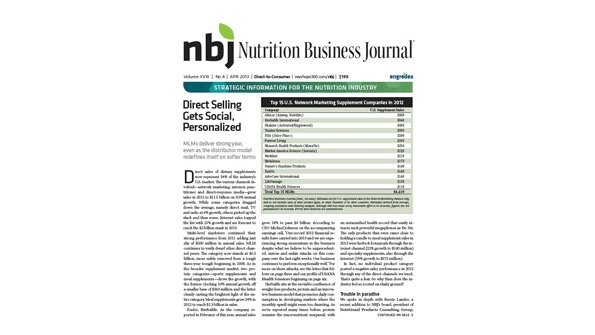April 29, 2013

rapid advances in genetic sequencing technology have finally begun to trickle into the supplement industry, bringing opportunistic marketers a-calling. Some companies now produce customized supplement regimens and nutrition programs based off a DNA sample provided by customers. The notion is cutting edge, certainly—personalized medicine is a trend that can’t be ignored. But is this just another attempt to exploit consumers or are these personalized products really worthwhile?
“There are many layers here,” says Duffy MacKay, vice president of scientific and regulatory aff airs at the Council for Responsible Nutrition. “The deepest layer is at the cutting edge where you’re using someone’s genetic cheek swab to try to tailor a vitamin.”
One new personalized product is Amway’s Nutrilite Bodykey, which launched in March 2013. Bodykey is a weight management program that utilizes genetics to determine if an individual’s body responds best to reducing fat, cutting carbs or a more balanced diet in order to lose weight.
“We found that programs weren't designed for particular individuals, and they didn't take into account people’s individual behaviors,” says Jori Hartwig, chief marketing officer at Amway. “The research pointed us to customize a program based on an assessment and lifestyle indicators.”
The program incorporates fitness, nutrition, eating well and an at-home genetic test. Customers who partake in the program received a “Jump Start Kit” that includes meal replacement shakes, appetite control chews, green aloe shots, dietary supplements and the Inherent Health Weight Management Genetic Test. It supports customers for the first 30 days of the program.
“Bodykey by Nutrilite encompasses various components that are crucial to weight loss efforts,” says Hartwig. “It offers personalized programs designed for your individual genotype, products that support balanced nutrition and satiation, and keys to improving weight loss success—expert advice, online community encouragement and tracking tools to help make the behavioral changes necessary.” The consumer completes the genetic test by performing a simple check swab and mailing back the sample. It goes to a confidential lab where Interleukin Genetics, a personalized health company focused on genetics, then performs the analysis.
Finally, a personalized, “easy to understand” report explaining the results of the genetic test is sent back to the customer with recommendations for a diet and exercise plan.
Some companies like 23andMe just conduct the DNA mapping and refer individuals to their doctors for follow-on interpretation. Others provide products similar to Nutrilite, such as geneME, which makes genetically customized skincare products and supplements, or Vitaganic, which produces custom-made vitamins for health concerns such as addiction support or wrinkle support. Both geneME and Nutrilite conduct the genetic testing and then create the actual product.
“There’s always a little bit of a pause when someone does the laboratory analysis and then is also the same person providing the product recommendations,” MacKay says. “Not that it’s a bad thing, but I would encourage that someone talk to their doctor as well. You want to bring in someone that understands this stuff to make sure that they are using the best available evidence and they’re not overstating their case.”
Personalized vitamins should only be used on a case-by-case basis. For some, a simple, daily multivitamin may be enough, whereas others might need something specifically geared toward them. But Mackay does suggest at least taking a personalized approach to health.
“I would recommend at the minimum that people take a personalized approach to nutrition and really try to understand what they’re eating and filling the nutrient gaps with vitamins,” he says. “However, if you just eat a horrible, crappy diet and you’ve never taken a vitamin before, do you need to dive right into this area? Maybe not. There’s probably a lot of basic stuff you could do first.”
Although personalization has long been practiced by alternative medicine, genetic testing for vitamins is a new concept.
“While there are definitely some exciting and emerging areas, I think there’s a possibility that some companies might oversell the concept,” MacKay says. “Are we at the place where someone can grab your cheek swab and send it through the computer and say this is what you need? I don’t know if we’re there yet.”
You May Also Like



